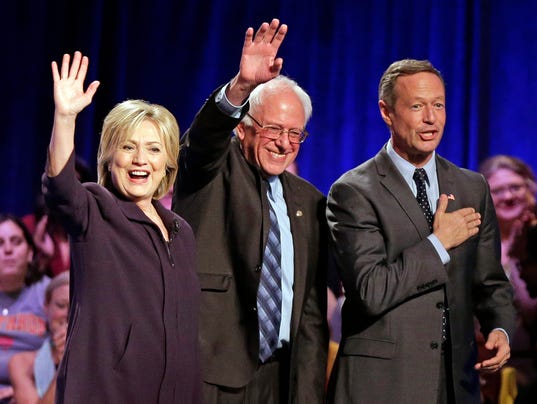By Nicole Gaudiano and Heidi Przybyla
The threat of terrorism will be a key topic during tonight’s Democratic debate in a reshuffling of plans by moderators following Friday’s attacks in Paris.
"Last night 's attacks are a tragic example of the kind of challenges American presidents face in today's world and we intend to ask the candidates how they would confront the evolving threat of terrorism,” said Christopher Isham , CBS News vice president and Washington bureau chief.
Democratic candidates former secretary of State Hillary Clinton , Sen. Bernie Sanders , I-Vt., and former Maryland Gov. Martin O’Malley will face off in their second debate Saturday night from 9-11 p.m. ET at Drake University in Des Moines, Iowa . CBS News is hosting the debate in conjunction with CBS' Des Moines affiliate, KCCI, and the Des Moines Register .
The Islamic State has claimed responsibility for the multiple Paris attacks, which killed at least 127 people. Americans will want candidates during the debate to explain their strategy for preventing such attacks from happening on U.S. soil, said Dennis Goldford, a political science professor at Drake.
“The question will be, Can Sanders look stronger (rather) than being soft and dovish?” asked Goldford. “Can Clinton thread this line between the doves and the hawks in this party? And can O’Malley say anything that makes him stand out and win him a second look from a lot of people?”
The attacks put in bright contrast what is probably the biggest remaining difference between Clinton and Sanders – her advocacy for a more muscular approach to using the U.S. military to combat terrorism across the globe.
The debate creates a challenge for Clinton, as it magnifies her public split with Obama on his approach to Syria . Several weeks ago, she was critical of Obama by saying there should be a no-fly zone and humanitarian corridors in Syria, something Obama’s rejected.
Clinton has long advocated for a more robust approach in the Middle East to thwart the Islamic State, including when she was a member of Obama’s administration . As a U.S. senator she voted to authorize the war in Iraq, though she has since called that decision a mistake.
Though Sanders voted for the war in Afghanistan, he opposed Iraq and has highlighted that difference with Clinton. Sanders, who believes the Islamic State must be defeated primarily by Muslim nations in the region, opposed Obama’s recent decision to putSpecial Operations boots on the ground in Syria while a Clinton spokesman said she “sees merit” in the approach.
“I think people across the country, no matter their stand on something like the Iraq war, recognize it’s vital to defend our nation,” said Tad Devine , Sanders’ senior adviser. “I think he’ll speak to that.”
For Clinton, Saturday will provide an opportunity to address Republicans who question her accomplishments as secretary of State. “It also give her a way of contrasting herself with her Democratic opponents who have not had the kind of experience that lends to foreign policy credibility,” Goldford said.
Beyond Saturday’s debate, the attacks are likely to change the focus of the Democratic primary, which has heavily concentrated on economic and domestic issues including income inequality, student debt and guns.
Sanders has struggled to regain his footing after Clinton solidified commanding leads over him in national polls and in Iowa and erased his advantage in New Hampshire. A shift to national security issues and terrorism plays to her strength, as the nation’s former top diplomat, and will put him in a potentially uncomfortable position of defending his more hands-off approach to the Middle East. Early reports suggest at least one of the attackers was a young Frenchman with links to terrorism, making clear that Islamic State is taking its campaign to the West.


No comments:
Post a Comment